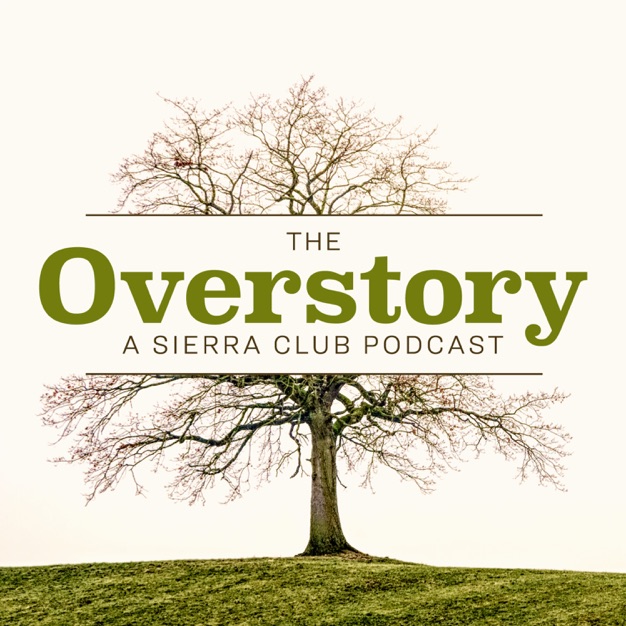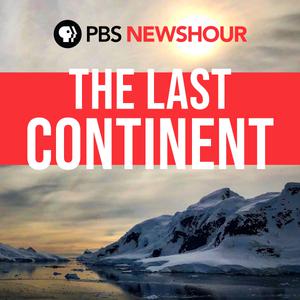
The Overstory
Sierra Club
The Overstory, a podcast from Sierra Club, brings listeners some of the most surprising, heartfelt, and provocative stories from across the American landscape. With each episode our reporters go beyond the latest news headlines as they profile the people and places on the front lines of environmental activism.
- 36 minutes 48 secondsThe Future is Bright: S2, Ep. 6The terrible, horrible, mostly bad year of 2020 marks a decisive break with the past. But what will come next? What will the future look like? In this episode of The Overstory we imagine a brighter, better future with an all-star roster of activists and authors. Melissa Nelson of The Cultural Conservancy discusses what it will take to Indigenize the conservation movement, Black urbanist Kristen Jeffers envisions a new kind of city, Varshini Prakash of the Sunrise Movement offers her take on youth activism, and the Sierra Club's director of campaigns, Mary Anne Hitt, tells us what a clean energy future can be like.14 December 2020, 8:16 pm
- 35 minutes 55 secondsThe End of Oil Is Near: S2, Ep. 5
After a late-summer break, The Overstory is back with a new episode. We talk with energy reporter Antonia Juhasz, who explains why the COVID pandemic may be the nail in the coffin for the global oil and gas industry. Juliet Grable, a frequent Sierra magazine contributor, talks about what it was like working as a volunteer fire fighter battling the recent wildfires in Oregon. And our advice columnist, Ms. Green, has tips for how to recycle old underwear and socks.
5 October 2020, 5:04 pm - 36 minutes 24 secondsThe Movement for Black Lives Saves the Planet: S2, Ep. 4
On this episode of The Overstory, we explore the connections between systemic racism and environmental destruction. Hop Hopkins, director of the Sierra Club's strategic partnerships, discusses how the ideology of white supremacy fuels environmental degradation and social injustice. Corina Newsome talks about how she co-organized the online happening, #BlackBirdersWeek. Plus: NASA climate scientist Dr. Kate Marvel explains why the pandemic doesn't have an environmental silver lining and Christy Goldfuss, a former Obama White House official, breaks down the Trump administration's assaults on bedrock environmental laws.
20 July 2020, 6:58 pm - 34 minutes 23 secondsResistance is Fertile: S2, Ep. 3
On the latest installment of "The Overstory," we talk with some of the people who are coping with the pandemic by getting closer -- much closer -- to the earth. The co-CEO of Johnny's Selected Seeds discusses the skyrocketing demand for vegetable seeds sparked by "pandemic planting," while urban farmers Kanchan Dawn Hunter and Novella Carpenter answer listeners' gardening questions. Our advice columnist, Ms. Green, talks with her mom about how to grow "zombie" crops on the kitchen counter. Plus: A radio diary from Nicole Hill, a woman in Detroit who is organizing against water shut-offs.
12 June 2020, 3:13 pm - 36 minutes 38 secondsGetting Out into Nature (Safely) Amid the Pandemic: S2, Ep. 2
In this episode of The Overstory, we're getting out into nature--slowly, safely--and exploring what that looks like in the age of pandemic. We talk with journalist and urban farmer Novella Carpenter about how to grow your own vegetables, while our advice columnist, Ms. Green, talks about how to reduce food waste and shop smart while you're sheltering in place. Reporter Jackie Bryant offers tips for how to recreate outdoors while still maintaining physical distance from others. And investigative journalist Adam Federman discusses how the National Park Service is navigating the pandemic. Plus: Dr. Scott Sampson, executive director of the California Academy of Sciences, shares a personal remembrance about how he fell in love with wild nature.
7 May 2020, 11:50 pm - 38 minutes 45 secondsEarth Day in the Time of Pandemic: S2, Ep. 1
Earth Day in the Time of Pandemic
The first episode of The Overstory's second season was originally intended as a celebration of the 50th anniversary of Earth Day. As the pandemic unfolded, we pivoted to consider what social activism will look like in this season of social distancing. Hear from Denis Hayes, founder of the Earth Day Network; Zero Hour founder Jamie Margolin; author and artist Jenny Odell; and the Reverend Lennox Yearwood, Jr. Plus also: Ms. Green explains her investigation into PFAS in menstrual underwear.
3 April 2020, 3:14 pm - 27 minutes 12 secondsEp. 9: Birding For Change
On Episode 9 of The Overstory we go birding with Jason Ward, an impassioned birder in Atlanta, Georgia whose enthusiasm and social media savvy is helping to attract younger and more ethnically diverse groups of people into the world of bird-watching. We also hear from climate activist Patrick Houston about his tips for social change, and talk with Haviland Whiting, the youth poet laureate of Nashville. Plus: Ms. Green discusses the challenges of being a vegan.
17 December 2019, 4:54 pm - 34 minutes 18 secondsEp. 8: Rewilding Patagonia
We take listeners to the far reaches of Chilean Patagonia, where U.S. philanthropist Kris Tompkins has overseen the largest act of wildlands philanthropy in history. On a new segment of the show, we hear directly from frontline activists who provide us with tips and hints about effective environmental advocacy. And speaking of advice, we introduce our new sustainable living advice columnist, Ms. Green—aka Jessian Choy. Plus, a conversation with Doria Robinson, a resident of Richmond, California who lives in the shadow of a giant Chevron oil refinery.
6 November 2019, 8:39 pm - 30 minutes 27 secondsEp. 7: The Climate Strike
Episode 7 opens with a dispatch from the historic climate strike, as we follow youth climate organizer Daphne Frias while she navigates the New York City march from her wheelchair. We also take listeners to the White Mountains of New Hampshire, where we feed Oreos to a bear (in the name of science, of course!) and learn about the latest findings on animal intelligence. We hear from a West Virginia woman who is using her singing voice as a vehicle for environmental activism. And we say a fond farewell to our longtime advice columnist, Mr. Green.
4 October 2019, 10:49 pm - 29 minutes 37 secondsEp. 6: Underwater
We begin this episode with a trip to Miami's "Little Haiti" neighborhood, whichis grappling with "climate gentrification" as rising sea levels and sunny day flooding make the city's high elevation districts attractive to developers. Mr. Green, our advice columnist, talks about the environmental impacts of dogs. And we hear from a cancer survivor who is battling plastic pollution in Great Britain by paddling all of England's rivers.
18 April 2019, 4:20 am - 29 minutes 2 secondsEp. 5: Drawdown
We talk with author-activist Paul Hawken about his new book, "Drawdown," and why he thinks that global warming may be a blessing instead of a curse. Also, we travel to Acadia National Park in Maine, where National Park Service biologists are experimenting with what's called "assisted migration" to help tree species cope with climate change. Also: sustainable living tips from our advice columnist, Mr. Green, and a moving radio diary from a North Carolina woman demanding clean water for her town.
6 March 2019, 11:46 pm - More Episodes? Get the App
Your feedback is valuable to us. Should you encounter any bugs, glitches, lack of functionality or other problems, please email us on [email protected] or join Moon.FM Telegram Group where you can talk directly to the dev team who are happy to answer any queries.
 TahoeLand
TahoeLand
 BirdNote Presents
BirdNote Presents
 Broken Ground
Broken Ground
 The Last Continent
The Last Continent
 Sierra Club
Sierra Club